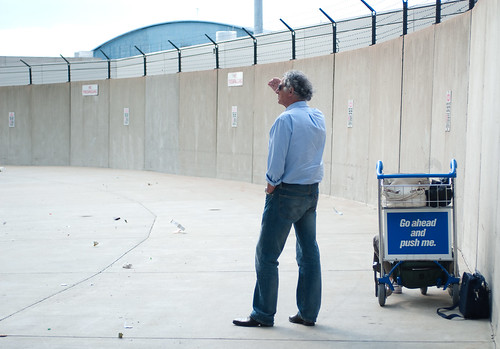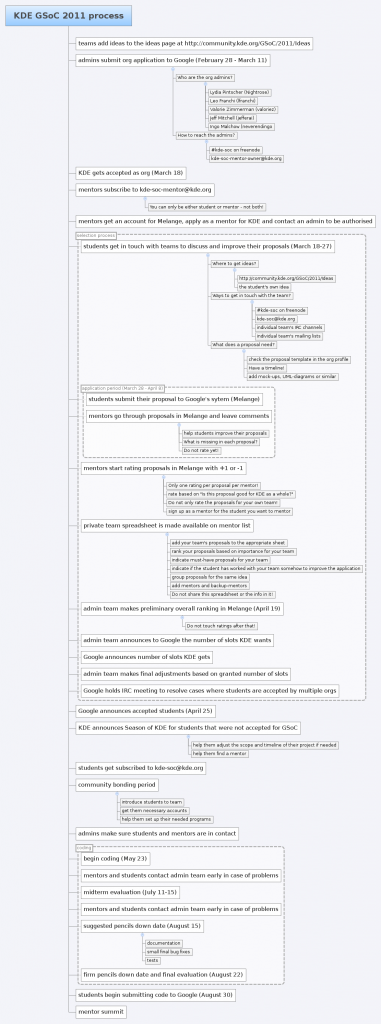
The following is a guest post by my friend Asheesh Laroia, who is one of the people behind OpenHatch.org and other awesomeness on the internet and in real life.
Are there contributors on project mailing lists sitting on the sidelines, waiting to get involved? For GIMP and Vidalia, at least, the answer is Yes.
The GIMP is the famous desktop image editor. Vidalia is a cross-platform desktop app for managing your connection to the Tor anonymity network. Akkana Peck and chiiph, respectively, offered to help new contributors compile the app for the first time and join their communities. The offers created a sense of urgency by naming a specific time to be in the chat room. (Read them: GIMP, Vidalia.)
The point of the event was to find out if actively inviting people to participate could grow the team. I was hoping it would kick prospective contributors into gear, so it was crucial that we named a specific time to be on IRC. I generally hoped the event would prove the existence of a vast, invisible class of contributors: people who aren’t contributing simply because nobody has asked them to. (You can read more about these “Build it” events in the OpenHatch wiki.)
First, the GIMP
Akkana promised that she’d be on the GIMP IRC channel at 03:00 UTC. A few hours early, one person arrived. His motivation was to improve the GIMP Python scripting system:
<kandinski> I would like to help, if possible, with improving python scripting
<kandinski> right now I am writing a script half in scheme half in python
<kandinski> because the scheme has better access to gimp internals, and the python allows me to manipulate the filesystem
It took the attendee some time to download all the dependencies. After 03:00 UTC hit, kandinski began asking development questions:
<kandinski> what happens when you have a configure.ac but not a configure
<akk> Anything from git, you have to run ./autogen.sh instead of ./configure
As the build progressed, kandinski repeated his enthusiasm:
<kandinski> I have been looking for a floss project to pitch in to and maybe learn something from
In the middle of the event, Akkana took a break to tell us in #openhatch how the event was going.
<akk> Only one person showed up for it but it’s good anyway — they want to contribute to python bindings (which is something I’ve been meaning to get off my duff and learn about too)
<akk> so we can inspire each other.
<akk> So not a big “class” but worth doing anyway.
As I read her summary at 1am, I was glad that Akkana retained some enthusiasm. But I was kind of embarrassed that Akkana had set aside time for an event with so few attendees.
Vidalia
I have a philosophy about expectations: it’s more okay to disappoint my friends than total strangers. Akkana will forgive me for possibly wasting her time, but I don’t even know chiiph!
So I did a late-night outreach push for the Vidalia event: I sent chiiph’s post to the #gsoc IRC channel, asked people on the #ubuntu-women IRC to help get the word out, and wrote an email to tor-talk, the Tor discussion list. Then I went to sleep.
chiiph’s event was to start at 13:00 UTC. As I slept, he announced the start of the event in the #vidalia room:
<chiiph> and we are on 🙂
At 13:30 UTC, I woke up. The channel was quiet. I had seen people joining the channel before I went to bed; what happened? A little frantic, I pinged one of the people who joined the night before. (My nick is paulproteus.)
<paulproteus> exa: Psst, hi there
<exa> paulproteus: hi :]
<paulproteus> Are you here for the Build It event?
<exa> yep
After a few minutes, chiiph led a group of five prospective contributors through the process of building Vidalia. Many of the attendees were running Debian-based systems, so a simple “$ sudo apt-get build-dep vidalia” was all it took to get their system configured.
Two attendees seemed particularly enthusiastic about the event:
<nishmu> Okay, now I got all things set up now. now moving on to coding.
<jrklein> FYI, I think that this type of meet is a great idea! I’ve been using tor for several years and hosting high-bandwidth tor servers for a year or so now. Haven’t been using the bundle for OSX all that long, but very happy/impressed with it. 🙂
Within a few hours, they had asked for bugs to work on; chiiph and I obliged and found some good tasks for the newcomers. chiiph seemed reasonably chirpy about the event. Later on Friday, he wrote:
<chiiph> jrklein: ah, right, you are an OSX user… we need more of you in here 😀
Going forward
Will these newcomers be converted into contributors and participate in development? That’s now up to the GIMP and Vidalia communities. The most important thing is that the newbies are plugged into communication systems that the developers use. Both projects are quite IRC-heavy, so if they stick around, there is a good chance that they will be put to good use.
I’m interested in ideas to improve the structure of the event. Akkana knew that building the GIMP might take a long time because of a long dependency chain; kandinski suggested that the event invitation provide some steps for attendees to take (like downloading the tarballs of dependencies) the day before the event.
I also learned that doing good outreach for these events makes a world of a difference. Even though the GIMP has many more users than Vidalia, the Vidalia event had many more participants. Vidalia attendees reported hearing about the event through the #gsoc IRC channel and the tor-talk mailing list. For the GIMP, Akkana emailed the gimp development mailing list and posted on her blog, but we could have done more, like reaching out to the gimp-user email list or any of the web forums where GIMP users spend time. Next time, we should make a checklist for event organizers like Akkana to be sure they think through all the outreach venues that make sense.
chiiph learned to be more pro-active about getting people to speak up:
<chiiph> one thing you should comment other people that do this is the pro-active approach
<chiiph> I mean, I was just expective questions
<chiiph> instead of shouting “ask ask ask ask” 🙂
<chiiph> luckily, you came
For me, the whole point of the event is to be pro-active about asking people to join in. I think it worked.
If you read this far, you’ve earned a quip from me. If you work on a free software project and you wonder why your users aren’t getting involved, I’ll tell you: You’re probably not inviting them to take concrete, non-intimidating actions that move them along the path toward contributing. After asking for jrklein to jump over the hurdle of compiling Vidalia, chiiph got more than that: a contributor on OS X.
I want to thank Danny Piccirillo for helping do outreach for the Build It events, and Akkana for chatting with me long enough for us to come up with this idea.
How you can do this, too (and more about OpenHatch)
OpenHatch is an open source community that helps newcomers find their way into free software projects. We work toward this goal through the OpenHatch.org website and outreach events.
If you want to grow your project, we want to work with you and help that happen. Our wiki has more information about how we ran these Build it events. The best way to get in touch is by joining #openhatch on irc.freenode.net. You can also subscribe to the OpenHatch blog to read our periodic updates.


